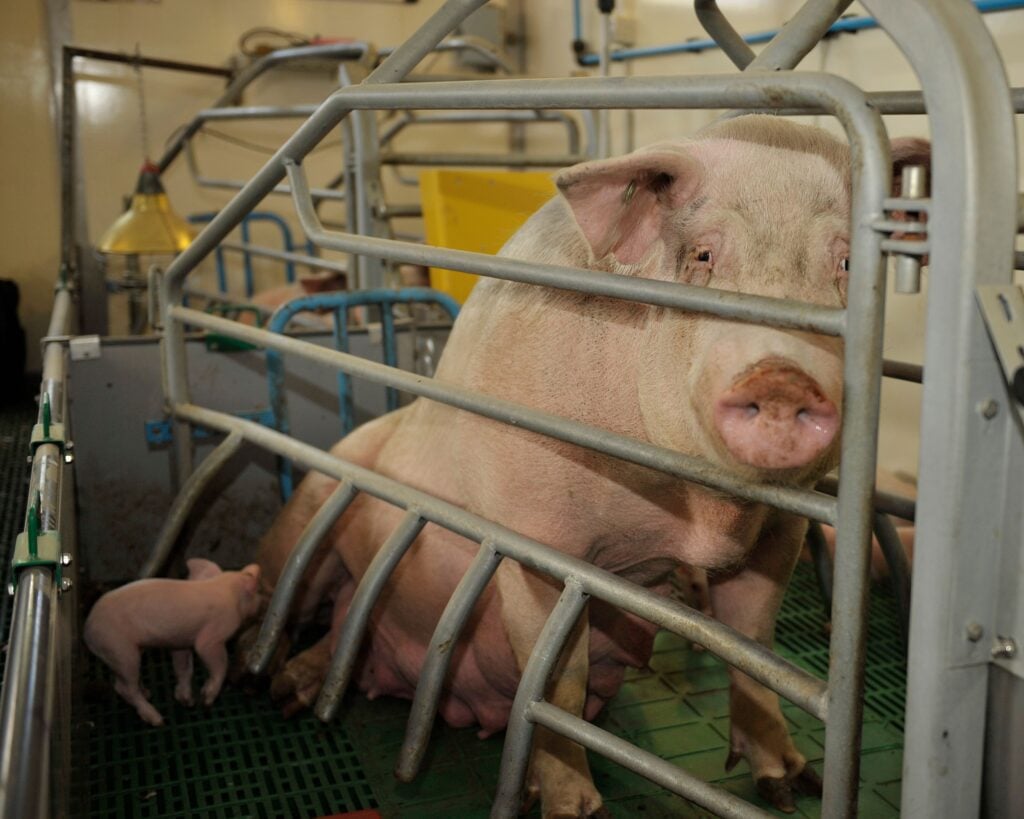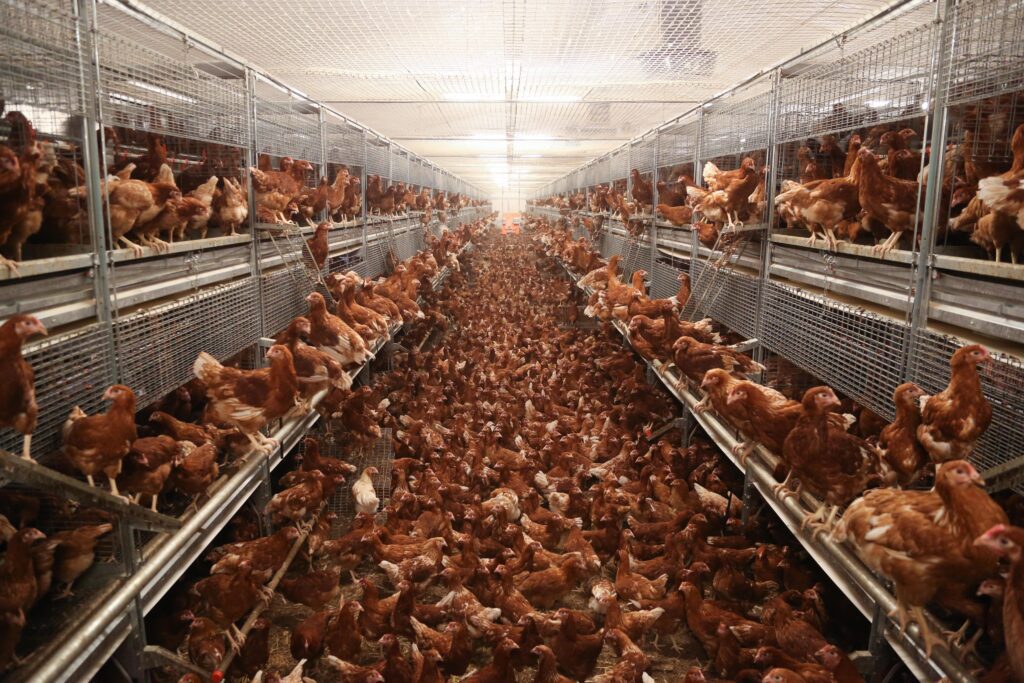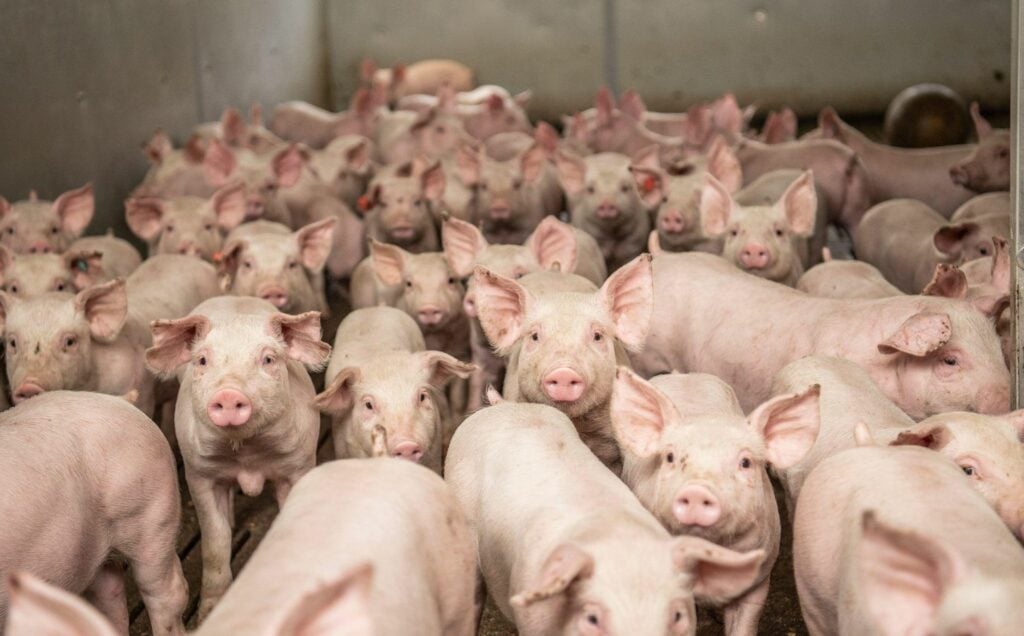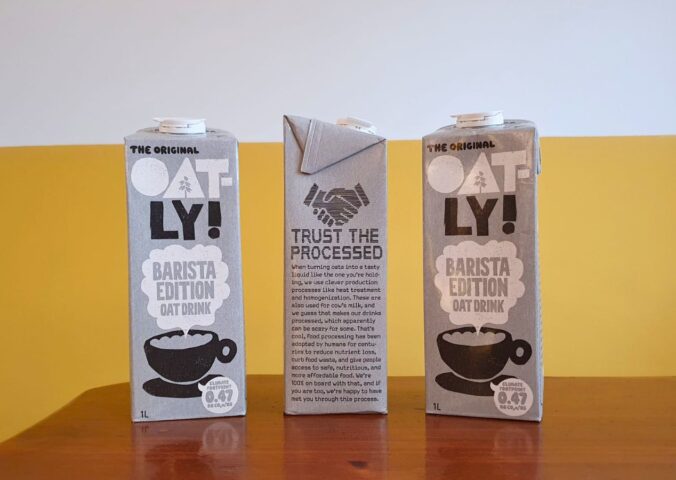In October of last year, a fast food chain released an advert offering a nice wholesome glimpse into the world of UK farming.
Our meat is from British farms, it said, while farmers rode around muddy green fields in their tractors. Animals were seen out in the sun, wandering among the trees, and even trotting across a countryside bridge. As a chicken strolled about the grass beside a farmer planting a tree, a soothing voice-over told viewers they could invest millions into our nation’s farms by eating at McDonald’s.
Adverts like these (and there are many, many, adverts like these) reinforce a prevailing idea of a supposedly high standard of animal welfare we have in this country, an idea that so many use to justify their meat consumption.
But while Brits are boasting about our “high welfare,” millions of animals are being quietly subjected to pain, torture, and misery.
Around 85 percent of animals in the UK are now raised on factory farms. They are confined to cramped barns and cages too small for them to turn around in, and offered no chance to exhibit natural behaviors.
And things are getting worse.
Earlier this month, a report from the Guardian found that the UK now has more than 1,000 US-style mega-farms spread around the countryside. These farms can hold hundreds of thousands – and in some cases more than a million – animals at a time.
But despite this, the UK government claims we have “world leading standards” of animal welfare. The Animal Welfare Act 2006 even makes it an offense to cause captive animals unnecessary suffering.
But what are these animal welfare standards? How often are they broken? And exactly what action will be taken on those who do break them?
Chicken ‘welfare’ on UK farms
Of the 1.12 billion chickens killed for meat annually in the UK, around 95 percent are factory farmed. Hundreds of thousands of these birds can be kept in one barn. They are often afforded a piece of space smaller than an A4 sheet of paper.
The sheds become very hot, especially in the summer. In the UK heatwave of summer 2022, millions of chickens died as temperatures in sheds reached 45C. Industry whistle-blowers claimed little was done to protect them.
Chickens used for their eggs will be born in a hatchery. Male chicks are useless to the industry, so they’ll be killed at birth. In the UK, this is usually done by gassing. Around 42 percent of UK hens are in caged systems. They are forced to stand on wire mesh and, again, have about the space of an A4 sheet.
Egg-laying hens have been selectively bred to produce around 300 eggs a year (they would naturally lay around 12). This means that they often suffer from osteoporosis and fractures. When their bodies are worn out, they are killed for meat.
Treatment of pigs on UK farms
Around 10 million pigs are farmed and killed each year, and at least 60 percent of these are factory farmed. Sows are forcibly impregnated from the age of six months, and kept in “farrowing crates” for up to five weeks after giving birth. These are barred metal cages that offer her no room to turn around, and barely space to move at all. Her piglets are able to suckle from an area next to the crate known as “the creep,” but the sow cannot access, nuzzle, or in any way take care of her children.

Farmers will also kill sick piglets with a process called external trauma (also known as “thumping”), which means picking them up by their back legs and bashing their head against the wall or floor, sometimes in front of their mothers. The National Pig Association calls this an “effective and appropriate way of humanely killing a piglet.”
Thumping was catapulted into the public consciousness when a 2018 investigation by Animal Equality filmed a number of animal abuse instances at the Red Tractor-certified Rosebury Farm. While the farm lost its certification for using electric prods to get pigs into slaughter trucks, the Red Tractor defended pigs being killed by being bashed against the wall.
“Sadly, some animals on livestock farms become too ill to treat,” it said in a statement. “In these emergencies and to avoid unnecessary pain or suffering, farmers using an internationally recognised method and having been trained by their vet are permitted by law to humanely ‘dispatch’ such casualty animals.
“This is in line with all other assurance schemes including the RSPCA.”
Non-factory farmed animals
But what about the remaining five percent of chickens, 40 percent of pigs, and 58 percent of egg-laying hens who aren’t intensively farmed? Surely they must have a lovely McDonald’s advert-esque time of it?
Meat from non-factory facilities is often sold as being high welfare, but this is largely a marketing tactic. As a former Red Tractor CEO said of outdoor reared pork: “The advantages are some people are prepared to pay more money for it because they think it’s better welfare.”
Outdoor-reared pigs aren’t put in farrowing crates, and they do have some access to outside. They also, however, usually spend half of their lives indoors, often in slatted pens. The outdoor space they do have isn’t the green pasture you’re imagining, but sometimes no more than a concrete enclosure. To be sold as “outdoor-bred,” pigs only have to be born outside, but they’ll often be brought in after the first four weeks of their life.
The majority of British eggs are from “free-range” systems, but the label is a con. All “free-range” means is that the chickens have some access to the outside. Many free-range chickens are kept in cramped barns with tens of thousands of other birds, and this “access” can just be a barn door they may never be able to reach.

The entire notion of “Factory farm: bad, other farm: good” is a complete farce. It exists to ease the conscience of the consumer, not better the lives of animals.
Breaches of animal welfare laws
Outlined above are the perfectly legal way animals are treated in line with our supposedly optimum “animal welfare” laws. But what about breaches of these laws? We all hear horrific stories of animals being abused on farms and in slaughterhouses, but aren’t these just unfortunate anomalies?
When you look at the data, it appears that illegal animal abuse is the rule, not the exception.
Stunning an animal before cutting its throat is a routine way to kill many UK farmed animals. The stunning is supposed to render the animal unconscious, meaning they theoretically won’t feel any pain. However, improper stunning is rife within the industry.
An investigation by Animal Aid into 11 UK slaughterhouses found that pigs were improperly stunned in almost every one. Pigs are therefore often alive when they have their throats cut, and some will also be conscious when plunged into scalding tanks, meaning they drown in extremely hot water.
Chickens are stunned in an electric water bath before being killed, but this is often ineffective. This means that they, too, can be scalded alive. Cows will also try to get away from the captive bolt pistol, meaning that workers will often miss the target.
Farm investigations
There have also been countless undercover investigations revealing law breaches on farms over the last few years.
Animal Aid conducted investigations into 19 chicken farms (18 of which were Red Tractor-assured) supplying businesses like Asda, Nando’s, McDonald’s, and Tesco. It found workers deliberately kicking and stepping on birds, smaller birds unable to reach water, and sick birds thrown in a pile and left to suffer.
An Animal Equality investigation into a pig farm in Aberdeenshire, meat from which was being sold as Quality Meat Scotland’s “Specially Selected Pork,” found “a number of serious legal violations.” Perhaps most disturbingly, mother pigs were left to suffer from torn vulvas and prolapses. In one bit of footage, a sow was forced to walk for over one-and-a-half minutes to her death while her organs were protruding from outside her body.
In February, BBC Panorama showed an Animal Equality investigation into Madox Farm, a large dairy farm in Wales. It found that cows were being punched, kicked, and hit with metal shovels. Workers also left a sick cow to suffer for 24 hours, rather than paying for a vet to euthanize her. Milk from this farm was supplied to Costa Coffee, British Airways, Londis, and Budgens.
In 2018, the same organization found that calves were being thrown, slapped, and force-fed at an organic farm in Somerset. Some were denied water for up to 29 hours on some of the hottest days of the year. This farm was RSPCA Assured and supplied to Waitrose.
Prosecutions for animal welfare breaches
It is clear that illegal animal rights abuses, on top of those that are legally allowed to take place, are rife. But surely those involved must face the consequences?
Prosecutions for animal welfare-breaches regarding farmed animals are exceptionally rare in Britain. The countless investigations that unveil illegal animal abuse mostly fail to amount to anything more than a slap on the wrist.
As Justin Kersell, campaigns manager at Viva! previously put it: “[The authorities] don’t act because it would open up almost every farm in Britain to prosecution.”
Last September, Animal Justice Project hit out at the Crown Prosecution Service (CPS) for failing to prosecute Gressingham Foods, the UK’s largest duck producer, over a number of alleged breaches of animal welfare laws at one of its facilities. The facility slaughtered 14 million birds annually, and supplied to Sainsbury’s, Waitrose, Tesco, and Morrisons.
Ducks were seen “discarded like trash,” and some were left shackled upside down for up to 14 minutes before being killed. The CPS told Animal Justice Project that it would not be in the “public interest” to prosecute.
A country in denial
We call ourselves a nation of animal lovers, and so often become enraged by highly publized acts of cruelty. But this country’s problem goes a great deal further than footballers kicking cats.
While the UK pats ourselves on the back for our “world-leading” animal welfare, millions of animals are being quietly and systematically tortured. UK animal agriculture is built on abuse, and turning away from this fact gives the industry more power to build more farms and make more animals live in more horrific conditions.






